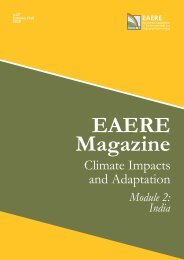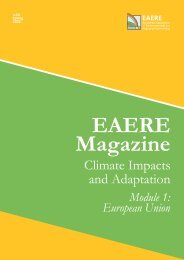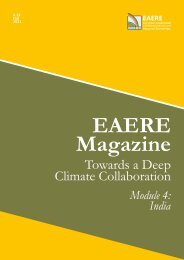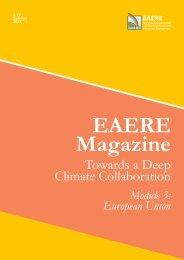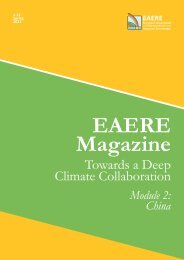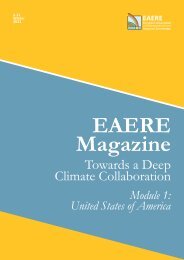EAERE Magazine - n.8 Winter 2020
Create successful ePaper yourself
Turn your PDF publications into a flip-book with our unique Google optimized e-Paper software.
Marty Weitzman,<br />
In Memoriam<br />
Gernot Wagner<br />
New York University, USA<br />
Gernot Wagner teaches at NYU and co-authored Climate<br />
Shock with Martin Weitzman, among others a Top 15<br />
McKinsey Financial Times Business Book of the Year 2015.<br />
There’s Weitzman (1979) that included both brilliant insights on optimal search<br />
theory and a brilliant reference to Greek mythology in form of “Pandora’s<br />
Problem.” There’s Weitzman (1976) and Weitzman (1998), spanning his work on<br />
green accounting and welfare. There’s Weitzman (1992) and Weitzman (1993),<br />
introducing set theory and economic thinking into species conservation. There’s<br />
Weitzman (2007a), a brilliant new take on the equity risk premium puzzle that appears<br />
to have eluded financial economists for decades. That insight, in turn, led to<br />
Weitzman (2009) and Weitzman (2011) and Weitzman (2012a), which introduce<br />
fat tails into the climate debate, something that had eluded climate economists.<br />
There’s Weitzman (2001), Weitzman (2010), and Weitzman (2012b), sparking<br />
hundreds of papers and epic debates on how to think about discounting the distant<br />
future. There’s Weitzman (1984), followed by Weitzman (1985a) and Weitzman<br />
(1985b) and Weitzman (1985c), introducing the Share Economy, on how and<br />
why workers should partake in profit sharing, an idea a New York Times editorial 1<br />
called the “best idea since Keynes.” Then there’s Weitzman (1974), Prices vs.<br />
Quantities, the brilliant analysis of when to price versus when to limit emissions<br />
that launched the field of instrument choice, sparked policy debates the world<br />
over, and launched many an environmental economist’s career. There are dozens<br />
more such papers, many offering brilliant insights to important problems, often<br />
using complex math to solve seemingly intractable problems, offering conclusions<br />
typically summarized in a simple equation or cleverly chosen bon mot.<br />
Then there’s Marty the teacher, person, and mensch. The kid from the Lower<br />
East Side who never did lose his New York accent. The person who, as a<br />
young professor in Cambridge, MA, bought a small, barren island in a marsh in<br />
1 https://www.nytimes.com/1985/03/28/opinion/best-idea-since-keynes-these-are-best-economic-times-for-most-americans-but-what.html<br />
23



